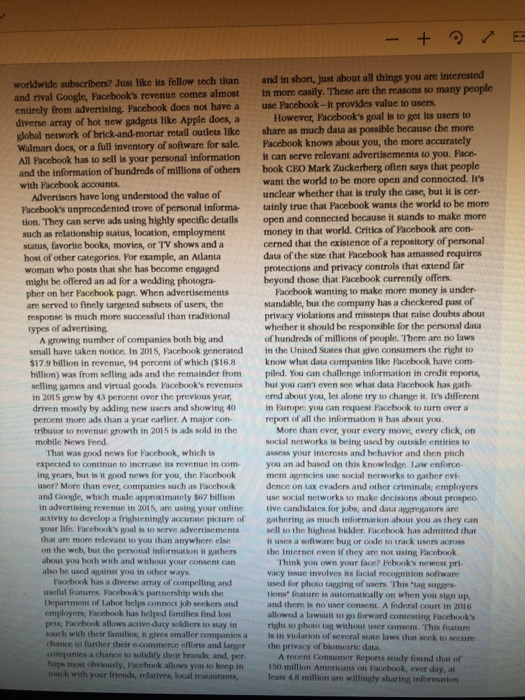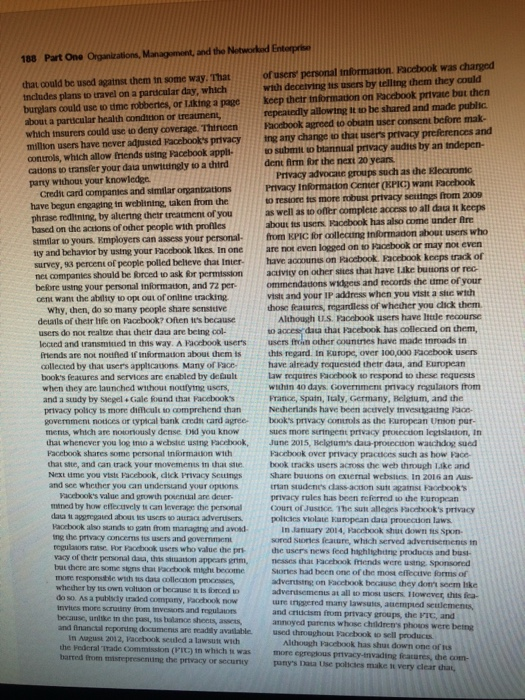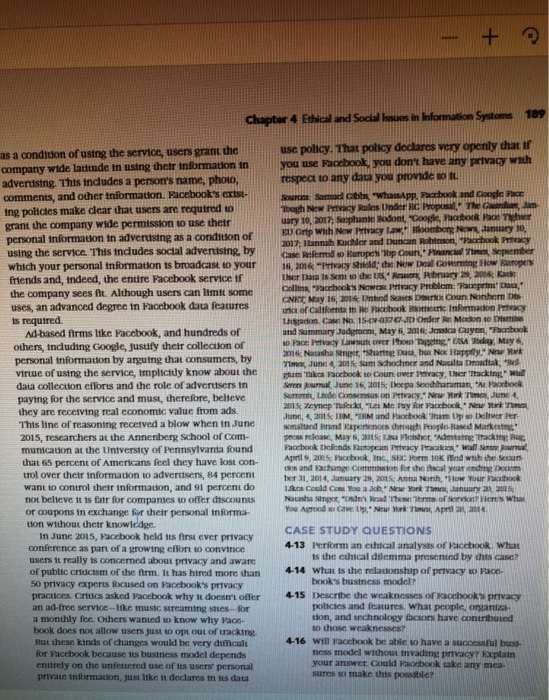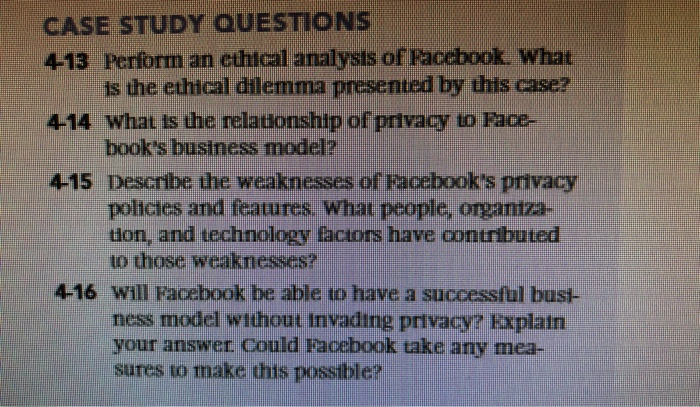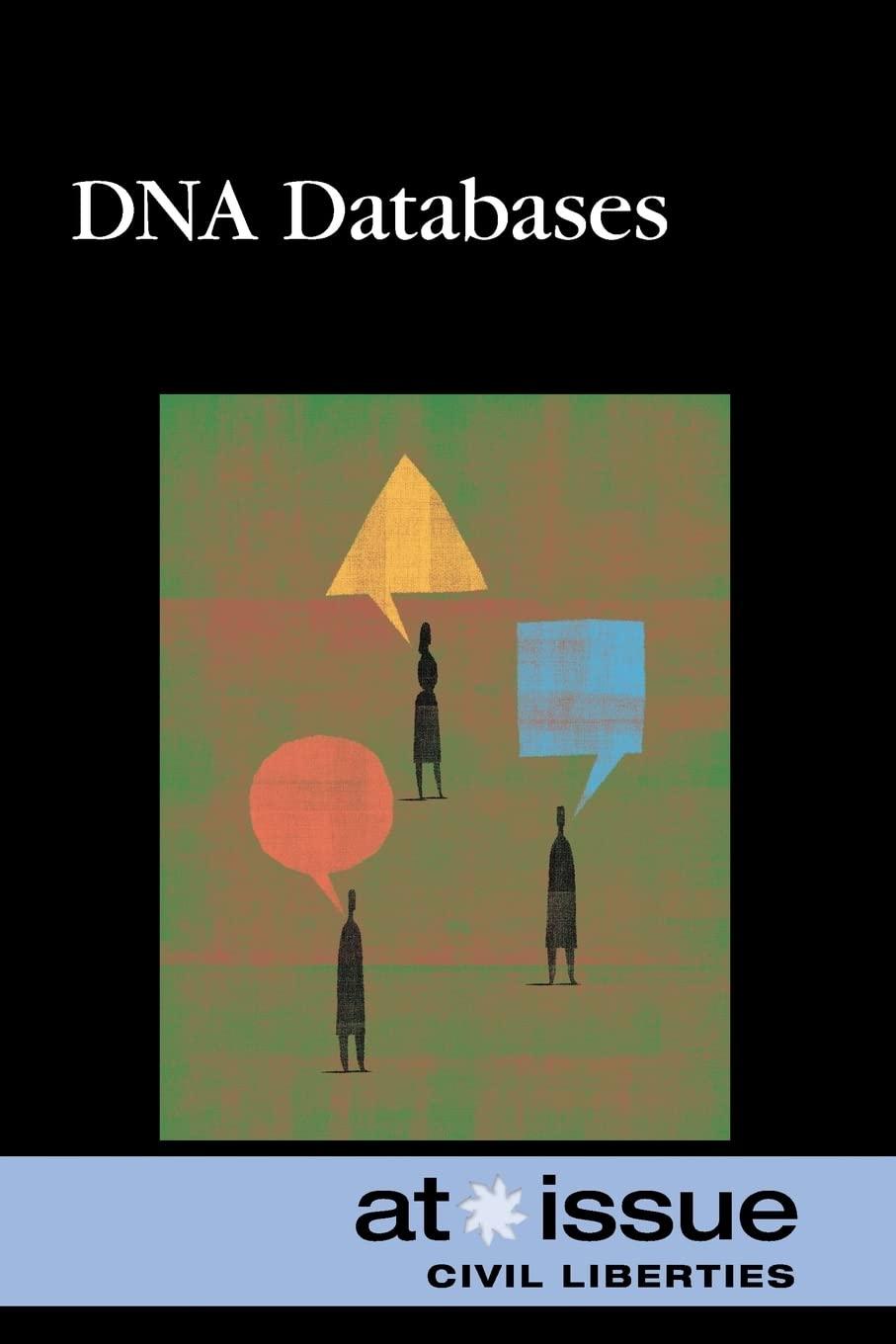Based on the study case below on Facebook please help me with the following questions in your opinions. 2-4 paragraphs. Thank you

Business Problem-Solving Case FACEBOOK PRIVACY: WHAT PRIVACY? In less than a decade, Facebook has morphed from aa market worth of $338 billion in 2016. Facebool small, niche networking site for mostly Ivy Leagueboasts that it is free to join and always will be, so college students into a publicly traded company withwhere's the money coming from to service 1.65 billion worldwide subscribens? Just like its fellow tech tian a and rival Google, and in short, just about all things you are interested in more easily. These are the reasons so many people However, Facebook's goal is to get its users to Pacebook's revenue comes almost from advertising, Pacebook does not have a use Pacebook-it provides value to users diverse array of hot new gadgets like Apple does,a global network of brick-and-mortar retail outlets like share as much data as possible because the more Walmart does, or a full inventory of software for sale. Pacebook knows about you, the more accurately All Pacebook has to sell is your personal information it can serve relevant advertisements to you. Face and the information of hundreds of millions of others book CEO Mark Zuckerberg often says that people want the world to be more open and connected. lt's unclear whether that is truly the case, but it is cer- Advertisers have long understood the value of nted trove of pensonal informa. tainly true that Pacebook wants the world to be more open and connected because it stands to make more tion. They can serve ads using highly specific details such as relationship satus, location, employment status, favorite books, movies, or TV shows and a host of other categories. For example, an Atlanta woman who posts that she has become engaged might be offered an ad for a wedding photogra- pher on her Facebook page. When advertisements are served to finely targeted suhsets of users, the response is much more successful than traditional money in that world. Critics of Pacebook are con- cerned that the existence of a repository of personal data of the size that Pacebook has amassed requires protections and privacy controls that extend far beyond those that Facebook currently offers Facebook wanting to make more money is under standable, but the company has a checkered past of privacy violations and missteps that raise doubss about whether it should be responsible for the personal data of hundreds of millions of people. There are no laws small have taken notice. In 2015, Facebook generated in the United States that give consumers the right to know what data companies like Pacebook have com- A growing number of companies both big and $179 billion in revenue, 94 percent of which ($16.8 billion) was from selling ads and the remainder from piled. You can challenge information in credit reports, mes and virtual goods. Facebook's revenues but you can't even see what data Facebook has gath- in 2015 grew by 43 percent over the previous year, ered about you, let alone try to change it. It's different driven mostly by adding, new users and showing 40 percent more ads than a year earlier. A major con- tributor to revenue growth in 2015 is ads sold in the in Furope: you can request Facebook to turn over a report of all the information it has about you More than ever, your every move, every click, social networks is being used by outskle entities to That was good news for Facehook, which is expected to continue to increase its revenue in com ing years, but is it good news for you, the Facebook user? More than ever, companies such as Facebook and Google, which made approximately $67 billion assess your interests and behavior and then pitch you an ad based on this knowledge. Law enforce- ment agencies use social networks to gather evi dence on tax evaders and other criminals, employers use social networks to make decisjons about prospec in advertising revenue in 2015, are using your online tive candidates for jobs; and data aggregators are activity to develop a frighteningly accurate picture of your life. Facehook's goal is to serve advertisements that are more relevant to you than anywhere else on the weh, but the personal information it gathers about you hoth with and without your consent also be used against you in other ways gathering as much information abhout you as they can sell to the highest bidder. Facebook has admitted that it uses a software bug or code to track users across the Internet even if they are not using Facebook Think you own your Eace? Febook's newest pri- vacy issue involves its facial recognition software used for photo tagging of users. This "tag sagges- Facrbook has a diverse array of compelling and useful features. Pacebook's partnership with the Department of Labor helps connect job seekers and employens, Pacebook has helped Eamilies find lost pets, Facebook allows acive duty soldiers to stay in ouch with their families. gives smaller companies a is in violation of several state laws that seek to secure chance to further their e-commerce efforts and larger the privacy of biometric data. companics a chance to solidily their brands and, por haps most obvkously, Pacebook allows you to keep in1 touch with your friends, relatives, local resaurants feature is automatically on when you sign up, tions i and there is no user consent. A federal court in 2016 allowed a lawsuit to go forward contesing Facebook's right to photo tag without user consent. This feature A recent Consumer Reports study found that of 150 million Americans on Facebook, ever day, ar least 4.8 million are willingly sharing information 188 Part One Organizations, Managoment, and the Notworked Entorprise fusers personal information Pacebook was charged that could be used agatnst them tn some way. That deceiving is users by telling them they could tncludes plans to travel on a paruicular day, which burglars oould use tme robberies, or 1Aking a page about a partucular health condition or treatment which insurers could use to deny coverage. Thrieen Paoebook agreed to obuatn user consent before mak- miltion users have never adjusted Pacebook's privacy ing any change eo that users privacy preferences and controls, which allow iriends ustng Facebook appl- cations to transfer your data unwittingly to a third keep their tnformation on Racebook private but then repeatedly allowing it o be shared and made public to submit to btannual pravacy audits by an tndepen- dent firm for the next 20 years Prvacy Information Center (KPIC) want Paceook as well as to ofler compleie access to all daca it keeps Privacy advocate groups such as the Elearonic Credit card compantes and simflar organtrations have begun engaging in weblining, taken from the phrase reditning, by alternng thetr treatment of you a based on the acztons of other people with profles stmflar to yours. Employers can assess your personal- ty and behavior by using your pacebook lkes in one are nox even lossed on to Pacebook or may not even survey, 83 percent of people polled beclheve that Inter h net companies should be forced to ask for permissionacrvity on other stes that have I befbre usimg your pensonal information, and 72 per-ommendatons widges and records the ume of your cent want the ability to opt out of onitne tracking about ts users Pacebook has also come under Bre from EPIC for ollecting imlormadon abour users who have accounes on Racebook. Facebook keeps track of ke buons or rec vist and your IP address when you vist a shic wth those features, regardless of whether you click them Why, then, do so many people share senstuve deuatls of their ltfe on Pacebook? Ofen tet's because users do not realtze that their data are being col- Although U.S. Facebook users have Ittle recourse to acces daca that Facebook has colleczed on them, lecued and uransmiued tn this way. A Pacebook users users fron other counthes have made inroads tn lected by that users applicatons Many of Pace have already requested thetr daua, and European Prance, spatn, Iualy, Germany, Belgtum, and the friends are not nottfled if information about them is this regard. In Europe, over 100,000 Facebook users book's feaures and services are enabled by detault when they are launched without noufyimg users, and a sudy by ssegel Gale found that Pacebooks privacy policy ts more diflcult to comprehend thanNeherlands have been aceively invesitgaung Pace government notices or typoal bank credit card agree, ments, which are noonously dense Did you know law requtres Facebook so respond to these requests wuhin 40 days Governmens privacy regulators from book's Intvacy :mnis as theropean Utson put- sues more suringent prrvacy prosecoon legtslauon, In that whenever you log imo a wehske using Facehook, June 2015, Helgtums daua-proxection watchdog sued Facebook shares some personal nformaon with that ste, and can track your movements tn hat s Facebook over privacy pracuces such as how Face book tracks users across the web through Like and Next ume you vistt Facebook, cdick Privacy SeusingsShare buuons on exiernal websites. In 2016 an Aus rtan saudenes dass-acion sutt agatnsi Facebook s and see whether you can undersand your opuons Facebook's value and growth posenal are deter- privacy rules has been referred to the European Court of Jusace. The sut alleges Facehook's privacy policies violate European data protecton laws mned by how effecuvely t cani leverage the personal data it agpregaund abous ts users so auraa adverusers Pacebook also sands to gatn from managig and avod ng the privacy concerns ts users and govermment rogulasors ratse For Facebook users who value the pr vacy of their personal daua, this stuaation appears gnm, bat there are some signs that Facebook might become more responsble wih ts data collecaion peocesses whesher by its own voltdon or because t ts florced do so. As a publady uraded company, Pacebook now invites more scratny from invesaoes and regulaors because, unltke in the pass, ts balance sheets, assens, and fnancual reponing documens are readity avatilable. used throaghout Vacebx In January 2014, Pacehook shut dowmt ts Spon sored sortes feature, which served adventsements the users news feed highlightng products and bust nesses that Facebook friends were using, sponsored Siores had been one of the most effecuve forms of advertsing on Facetbook bocause they dot'n seem like adverdsemenus at all so most users. However this fea- and cnuctsm from privacy groups, the Fic, and in Aagust 2012, Vacebook seuled a lawsut with the Pedcral Trade Commission (FIC) in which t wasmore barted from mistepresening the privacy or securty Althrough Facebook has shat down one of ns pany's Daia Uise policies make t very clear that, Chapter 4 Ethical and Social les in Information Syatoms 189 use policy. That policy dedlares wery openly that ir as a condition of using the service, users grant the company wide latnde tn ustng thetr informaton tn you use Pacebook, you don't have any privacy with use Facebook you don't have any privacy with adverustng. This includes a person's name, photo, comments, and other information. Facebook's extst- ing policles make cear that users are requtred to grant the company wide permission to use their personal tnformation tn advertstng as a condition of using the service. This tndudes social advertstng, by Case Rcied o uropes top Cout, Pranc Tme ember which your personal tnformation ts broadcast to your6rtvacy Shidld he Now Deal cowmi Hpes respect to any daa you provide no bagh New Pevacy ules Under BC Proposal, The Gu 2017, annh Kuter and Duncan Robitrson, acbook Prtvacy ources Samud Ciits, "WhaApp, Rccbook and Congle Pacz uary 10, aon7 Sephadont, "Goode Pacol Pace h orp wnh Now Priayaw.loombor Nth January No friends and, indeed, the entire Facebook service if the company sees fit. Although users can limit some uses, an advanced degree tn Facebook data features una of Calton lCNET May th ecbook somenc Inimaton Ad-based firms ltke Facebook, and hundreds of and Summary Judgmon May 6. 2016 Jsica Guym, Facrhook others, including Google, justify their colleciion of personal tnformation by arguing that consumers, by virue of ustng the service, implictdy know about thegum Tika Paccbook o Counoer Pawacy, user "Thacking" Wi data collection efforis and the role of advertsers in paying for the service and must, therefore, believes nde Cmmsus o ptacy y hrk , June t. Tma June 4,2015 sam Schochiner and Nacalta Droadtak sren journal, June 16, 2015 Depa Seohharaman aoo hey are receiving real economic value from ads This line of reasoning received a blow when in June 2015, researchers at the Annenberg School of com mumcation at the Untverstty of Pennsylvanta found acehok Defends sumpcin Ptvacy Iaak wall sapar ournal that 65 percent of Americans feel they have lost con- trol over thetr information to adverusers, 84 percent want to control their informaton, and 91 percent do not belteve tt ts fatr for companies to offer discounts Nousha sing mt rad ho Terms of serviar? lers Wh or coupons in exchange fer their personal tnforma. You Aerod (ave iM' , ytri Aprl ze, a014 tion without their knowlddge Aprl 9, 200 S Paccbook, Inc, SEC Rorm 10K fed with the Sour s and Eauca Comssion for tho fhscal year endimg Doonms ber 31, 2014, Jamuary 29, 2015: Anna Nonh How Your bok ukrs could C.me 0g a Job." Nw York n January au 201 CASE STUDY QUESTIONS 413 Periorm an cthical analysts of Facebook. What In June 2015, Facebook held its firsu ever privacy conference as par of a growing effort to convince users it really is concemed about privacy and aware of public criuctsm of the Arm. It has htred more than 414 whau ts the reladonship of privacy so Pace 50 privacy experis focused on Pacebook's prtvacy practuces critucs asked Facebook why it doesn't offer415 Describe the weaknesses of Faccbooks privacy H an ad-free service-like music streamt stes-for a monthly fee. Others wanted to know why Face- book does not allow users just tD opt out of tracking ts the ethical dilemma presenued by thts case? policies and features. What pcople, organtza- tion, and technology facsors have contributed t these kinds of changes would be very dimicult for Facebook because ts business model depends enurely on the unfetered use of its users personal private informaion, just like it declares in tts data 4-16 will racebook be able to have a successful bus- ness model without invading privacy? Explain your answer Could Pacebook take any mea- sures to make this possible? CASE STUDY QUESTIONS 4-13 Perform an ethical analysis of Facebook. What 414 What is the relatlonship of privacy to Face- 4-15 Describethe weaknesses ofcebook's privacy ts the ethical dilemma presented by this case? books bustness model? policies and features whau people, organtza tion, and technology factors have contributed to those weaknesses? 4-16 will Facebook be able to have a successful busi- ness model without invading privacy? Explatn your answer. Could Facebook take any mea- sures to make this possible


